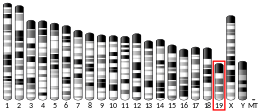RNA-binding protein 14 is a protein that in humans is encoded by the RBM14 gene.[5][6]
Interactions
editReferences
edit- ^ a b c GRCh38: Ensembl release 89: ENSG00000239306 – Ensembl, May 2017
- ^ a b c GRCm38: Ensembl release 89: ENSMUSG00000006456 – Ensembl, May 2017
- ^ "Human PubMed Reference:". National Center for Biotechnology Information, U.S. National Library of Medicine.
- ^ "Mouse PubMed Reference:". National Center for Biotechnology Information, U.S. National Library of Medicine.
- ^ Brett D, Whitehouse S, Antonson P, Shipley J, Cooper C, Goodwin G (Sep 1997). "The SYT protein involved in the t(X;18) synovial sarcoma translocation is a transcriptional activator localised in nuclear bodies". Human Molecular Genetics. 6 (9): 1559–64. doi:10.1093/hmg/6.9.1559. PMID 9285794.
- ^ "Entrez Gene: RBM14 RNA binding motif protein 14".
- ^ Iwasaki T, Chin WW, Ko L (Sep 2001). "Identification and characterization of RRM-containing coactivator activator (CoAA) as TRBP-interacting protein, and its splice variant as a coactivator modulator (CoAM)". The Journal of Biological Chemistry. 276 (36): 33375–83. doi:10.1074/jbc.M101517200. PMID 11443112.
Further reading
edit- Maruyama K, Sugano S (Jan 1994). "Oligo-capping: a simple method to replace the cap structure of eukaryotic mRNAs with oligoribonucleotides". Gene. 138 (1–2): 171–4. doi:10.1016/0378-1119(94)90802-8. PMID 8125298.
- Suzuki Y, Yoshitomo-Nakagawa K, Maruyama K, Suyama A, Sugano S (Oct 1997). "Construction and characterization of a full length-enriched and a 5'-end-enriched cDNA library". Gene. 200 (1–2): 149–56. doi:10.1016/S0378-1119(97)00411-3. PMID 9373149.
- Iwasaki T, Chin WW, Ko L (Sep 2001). "Identification and characterization of RRM-containing coactivator activator (CoAA) as TRBP-interacting protein, and its splice variant as a coactivator modulator (CoAM)". The Journal of Biological Chemistry. 276 (36): 33375–83. doi:10.1074/jbc.M101517200. PMID 11443112.
- Andersen JS, Lyon CE, Fox AH, Leung AK, Lam YW, Steen H, Mann M, Lamond AI (Jan 2002). "Directed proteomic analysis of the human nucleolus". Current Biology. 12 (1): 1–11. Bibcode:2002CBio...12....1A. doi:10.1016/S0960-9822(01)00650-9. PMID 11790298. S2CID 14132033.
- Brill LM, Salomon AR, Ficarro SB, Mukherji M, Stettler-Gill M, Peters EC (May 2004). "Robust phosphoproteomic profiling of tyrosine phosphorylation sites from human T cells using immobilized metal affinity chromatography and tandem mass spectrometry". Analytical Chemistry. 76 (10): 2763–72. doi:10.1021/ac035352d. PMID 15144186.
- Beausoleil SA, Jedrychowski M, Schwartz D, Elias JE, Villén J, Li J, Cohn MA, Cantley LC, Gygi SP (Aug 2004). "Large-scale characterization of HeLa cell nuclear phosphoproteins". Proceedings of the National Academy of Sciences of the United States of America. 101 (33): 12130–5. Bibcode:2004PNAS..10112130B. doi:10.1073/pnas.0404720101. PMC 514446. PMID 15302935.
- Perani M, Antonson P, Hamoudi R, Ingram CJ, Cooper CS, Garrett MD, Goodwin GH (Dec 2005). "The proto-oncoprotein SYT interacts with SYT-interacting protein/co-activator activator (SIP/CoAA), a human nuclear receptor co-activator with similarity to EWS and TLS/FUS family of proteins". The Journal of Biological Chemistry. 280 (52): 42863–76. doi:10.1074/jbc.M502963200. PMID 16227627.
- Nousiainen M, Silljé HH, Sauer G, Nigg EA, Körner R (Apr 2006). "Phosphoproteome analysis of the human mitotic spindle". Proceedings of the National Academy of Sciences of the United States of America. 103 (14): 5391–6. Bibcode:2006PNAS..103.5391N. doi:10.1073/pnas.0507066103. PMC 1459365. PMID 16565220.
- Lim J, Hao T, Shaw C, Patel AJ, Szabó G, Rual JF, Fisk CJ, Li N, Smolyar A, Hill DE, Barabási AL, Vidal M, Zoghbi HY (May 2006). "A protein-protein interaction network for human inherited ataxias and disorders of Purkinje cell degeneration". Cell. 125 (4): 801–14. doi:10.1016/j.cell.2006.03.032. PMID 16713569. S2CID 13709685.
- Sui Y, Yang Z, Xiong S, Zhang L, Blanchard KL, Peiper SC, Dynan WS, Tuan D, Ko L (Feb 2007). "Gene amplification and associated loss of 5' regulatory sequences of CoAA in human cancers". Oncogene. 26 (6): 822–35. doi:10.1038/sj.onc.1209847. PMC 9245580. PMID 16878147.
- Beausoleil SA, Villén J, Gerber SA, Rush J, Gygi SP (Oct 2006). "A probability-based approach for high-throughput protein phosphorylation analysis and site localization". Nature Biotechnology. 24 (10): 1285–92. doi:10.1038/nbt1240. PMID 16964243. S2CID 14294292.
- Olsen JV, Blagoev B, Gnad F, Macek B, Kumar C, Mortensen P, Mann M (Nov 2006). "Global, in vivo, and site-specific phosphorylation dynamics in signaling networks". Cell. 127 (3): 635–48. doi:10.1016/j.cell.2006.09.026. PMID 17081983. S2CID 7827573.
- Yang Z, Sui Y, Xiong S, Liour SS, Phillips AC, Ko L (2007). "Switched alternative splicing of oncogene CoAA during embryonal carcinoma stem cell differentiation". Nucleic Acids Research. 35 (6): 1919–32. doi:10.1093/nar/gkl1092. PMC 1874587. PMID 17337438.





